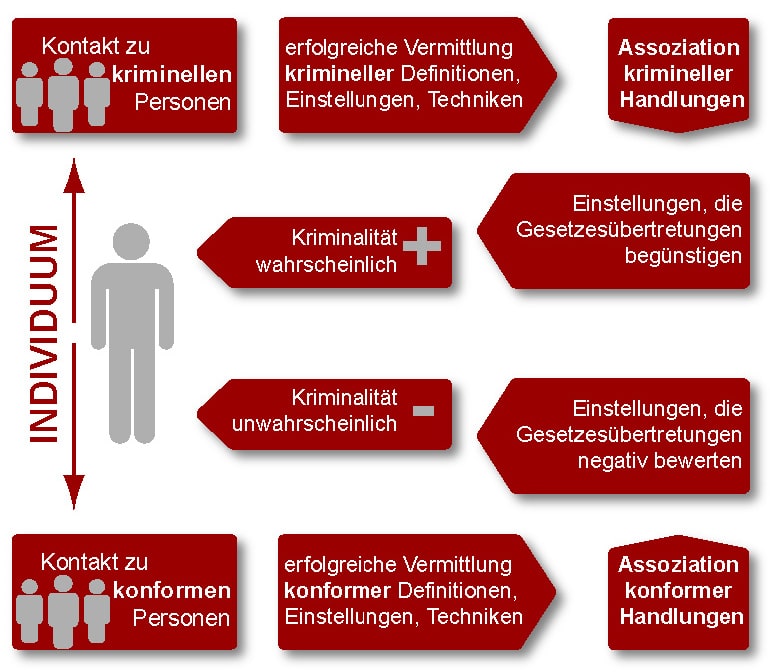The theory of social learning states that criminal behaviour is learned when the positive consequences of deviant behaviour are more powerful than the positive consequences of normative behaviour (operant conditioning).
Main proponent
Ronald L. Akers und Robert L. Burgess
Theory
Referring to Sutherland’s theory of differential associations, Aker’s theory of social learning poses the question of how criminal behaviour is learned.
The answer to this question is, on the one hand, the consideration of the Bandura principle of social learning, but above all the assumption that criminal behaviour is learned through the principle of operant conditioning.
Accordingly, the learning of criminal behaviour is dependent on whether it is differentially amplified – i.e. whether a deviant behaviour is positively stimulated or negatively stimulated – or whether it is punished or conformal behaviour is amplified more than criminal behaviour.
The decisive factors are therefore above all what reinforcing consequences are available for deviant behaviour, how effective they are, how intensively and frequently they occur, and how likely it is that they actually follow the behaviour shown.
Aker’s theory was therefore referred to in its first publication (together with Burgess) as the theory of differential amplification. The name change, however, makes it clear that Aker later considered the principle of model learning in addition to the concept of operant conditioning. Accordingly, the observation of the actions of others and their consequences can also lead to a strengthening of one’s own behaviour: The reward of an observing person for their behaviour has a strengthening effect in that the observed behaviour is now carried out by the person.
Thus, a direct social interaction process (in contrast to Sutherland’s theory) is not absolutely necessary here, since non-social situations (e.g. via the media) can also have an amplifying effect. However, Akers agrees with Sutherland in so far as criminal behaviour shown for the first time (whether it is subsequently intensified or not) mostly arises through contact with a criminal environment.
In summary, it can be said that Aker’s theory of social learning takes Sutherland’s basic idea as its starting point, expands it to include the idea of social learning, and finally explains the process of learning criminal behaviour through the principle of operant conditioning.
In this way, despite some similarities, it differs fundamentally from Sutherland’s theory of differential association: contact with criminal persons is not the cause of crime, but the reinforcement/reward of deviant behaviour.
Implications for Criminal Policy
Aker’s theory of social learning initially implies the same criminal policy implications as the theory of differential associations, but there are two crucial aspects that behavioural therapy attempts to address through concepts such as the token economy:
First, criminal actions must have such negative consequences that they outweigh the positive consequences. Conversely, conforming actions must be rewarded in such a way that their negative consequences recede into the background. Criminal policy must therefore prevent both the reinforcement of criminal behaviour and the punishment of compliant behaviour as well as support the punishment of criminal behaviour and the rewarding of compliant behaviour. A political kinship with rational choice theory cannot be overlooked here.
Secondly, the influence of the mass media on individual behaviour must be taken into account. Theories such as Akers’ thus lay the theoretical foundations for the ongoing discussions about the effects of violent ego-shooter games or violent movies.
What remains decisive, however, is the fact that according to Burgess and Akers, the mere observation of a behaviour does not lead to its imitation (as argued by Gabriel Tarde). Rather, the behaviour and its positive consequences must be observed.
Critical Appraisal & Relevance
Akers succeeds in theoretically integrating the processes and mechanisms of social learning that were missing in Sutherland’s concept of differential association theory, but even he cannot resolve the fundamental objections to the approach of learning theory (partially tautologous, individually different ability to learn, non-consideration of affect crimes).
Thus, the theoretical advancement through the consideration of the principles of social learning and operant conditioning is to be appreciated. However, Akers also fails in his attempt to present a pure learning theory as a general theory of crime.
Literature
Primary Literature
- Akers, Ronald L.; Burgess, Robert L. (1966). A Differential Association-Reinforcement Theory of Criminal Behavior. In: Social Problems, 14(2), 128-147.
- Akers, Ronald L. (1977). Deviant behavior: a social learning approach. Belmont, CA.
- Akers, Ronald L. (1998) Social Learning and Social Structure: A general theory of crime and deviance. Boston, MA: Northeastern Uniniversity Press.
Further information
- Akers, Ronald L.; Sellers, Christine (2004): Criminological Theories: Introduction, Evaluation, and Application. 4th. ed. Los Angeles: Roxbury Pub.
- Skinner, B. F. (1953). Science and human behavior. New York: Macmillan.
- Bandura, Albert (1963). Social learning and personal development. London: Holt, Rinehart and Winston.
- Bandura, Albert (1977). Social learning theory. Englewood Cliffs: Prentice-Hall.
- Beirne, Piers (1987). Between classicism and positivism: crime and penalty in the writing of Gabriel Tarde. In: Criminology, 25(4), 785-819.


